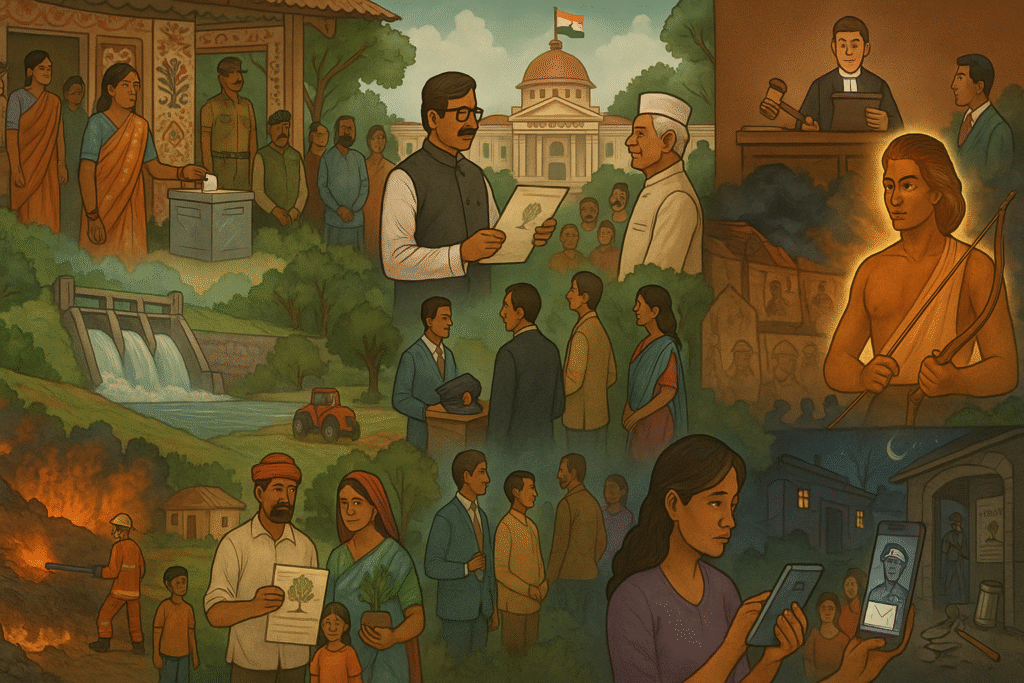
Assembly Elections 2024: A New Chapter in Jharkhand’s Democracy
Key Highlights:
- Jharkhand witnessed three-phase polling between 13 to 20 November 2024, with final counting on 24 November.
- Voter enthusiasm was visible with 67.59% turnout, slightly better than the 67.04% turnout in 2019.
- Elections were conducted across 38 constituencies in 12 districts, with special emphasis on tribal voter inclusion and PVTG representation.
- Hemant Soren was re-elected as the Chief Minister, taking oath on 28 November, leading his fourth government.
Innovative Features Introduced:
- Tribal-friendly polling booths with themed decorations.
- Use of Suvidha 2.0 portal to streamline permissions for rallies and campaigns.
- cVIGIL App empowered citizens to report code violations—99% of issues resolved swiftly.
Focus Area for Exams: Article 164 – CM appointment, cVIGIL features, digital election monitoring.
Mandal Dam Sees a New Dawn
After decades of stagnation, the Mandal Dam on the North Koel River moved forward with voluntary relocation by around 780 families from Palamu and Garhwa districts.
What’s New:
- Each family offered ₹15 lakh + 1 acre of land.
- The irrigation project is expected to benefit nearly 1.1 lakh hectares in Jharkhand and Bihar combined.
- Completion deadline: By the end of 2025.
Key Focus: Tribal negotiation models, inter-state water projects.
DGP Appointment Sparks Legal Controversy
Anurag Gupta’s appointment as the state’s police chief stirred debate due to alleged bypass of UPSC norms.
Legal Twist:
- Jharkhand High Court has demanded justification from the state, Centre, and Gupta himself.
- Raises constitutional and procedural concerns about top-level appointments in the state.
Exam-Relevant Point: Role of UPSC in DGP selection; HC’s constitutional oversight.
₹5,940 Crore Push to Jharia’s Burning Ground
The Union Cabinet sanctioned a revised Jharia Master Plan, reviving efforts to extinguish century-old coal fires in the region.
Plan Includes:
- Fire suppression.
- Relocation of affected families.
- Stabilization of land to prevent further damage.
Main Focus: Environmental governance, sustainable mining rehabilitation.
Failed Heist and Bank Security Concerns in Palamu
In a dramatic incident, an attempted robbery at Jharkhand Rajya Gramin Bank in Belwatika, Palamu was thwarted.
Why It Matters:
- Robbery attempt occurred soon after ₹10 lakh was looted during election days from the same branch.
- Highlights serious concerns over rural bank security during sensitive times like elections.
Relevant for Exams: Banking infrastructure & rural security loopholes.
Email the DGP: Fast-Tracking Women’s Grievances
A new email-based complaint channel was launched by Jharkhand Police for women and girls facing harassment.
Trigger: A serious case of harassment in Jamshedpur prompted immediate policy response.
Objective: Faster, more confidential redressal for women’s safety concerns.
Important Angle: Digital policing, gender-sensitive reforms.
Tribal Languages in Crisis: Urgent Revival Demanded
Despite their cultural richness, 31 tribal languages in Jharkhand face a bleak future, including Ho, Kurukh, Santali, Mundari, Kharia.
Demands by Language Experts:
- A dedicated Jharkhand Tribal Language Academy.
- Creation of a commission for curriculum, teacher training, and script preservation.
Exam-Focus: Language endangerment, tribal rights under Constitution (e.g., Article 350A).
Janjatiya Gaurav Divas – Remembering Birsa Munda
On 15 November, the state honored Birsa Munda—the iconic tribal leader and freedom fighter—on his birth anniversary.
Legacy Highlights:
- Led the Ulgulan Movement (1899-1900) against British rule.
- Founded a new faith known as Birsait, uniting tribal identity with spirituality.
- Referred to as ‘Dharti Abba’ (Father of the Earth).
- His resistance led to the enactment of the Chotanagpur Tenancy Act, 1908.
Why It’s Important: Tribal rebellion, freedom movements, land rights legislation.
Tribal Resistance Movements: The Roots of Jharkhand
Throughout history, Jharkhand’s tribal communities fought fiercely to protect their land and identity.
Major Uprisings:
- Dhal Revolt (1767–1777): Led by Jagannath Dhal, marking the beginning of sustained tribal resistance.
- Munda Rebellion: Under Birsa Munda, aimed at removing British rule and establishing tribal self-rule.
- Tana Bhagat Movement (1914): A peaceful, reformist revolt led by Jatra Bhagat advocating non-violence and no-rent campaigns.
Result: These movements fueled the Jharkhand Statehood Movement, culminating in the state’s formation in 2000.
Key Insight: Tribal legacy and state formation—link with GS Paper I & II topics.

One thought on “Jharkhand Current Affairs – November 2024”